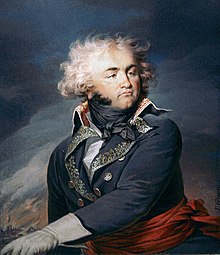Jean Baptiste Kléber
| Jean-Baptiste Kléber | |
|---|---|

General Kléber, by Jean-Urbain Guérin, Nationalmuseum,
|
|
| Born |
9 March 1753 Strasbourg, France |
| Died | 14 June 1800 (aged 47) Cairo, Egypt |
| Buried at | Place Kléber, Strasbourg, France |
| Allegiance |
|
| Service/branch |
French Royal Army Imperial Army French Revolutionary Army |
| Years of service | 1769–1770 (France) 1777–1783 (HRE) 1792–1800 (France) |
| Rank | General de Division |
| Unit |
1st Hussar Regiment Regiment Kaunitz |
| Commands held | 4th Haute-Rhin Battalion Army of Sambre-et-Meuse Army of the Orient |
| Battles/wars |
War of the Bavarian Succession
|
| Awards |
Inscription on the Arc de Triomphe (Southern Pillar, Column 23) |
War of the Bavarian Succession
French Revolutionary War
Jean-Baptiste Kléber (IPA: [ʒɑ̃ batist klebɛʁ]) (9 March 1753 – 14 June 1800) was a French general during the French Revolutionary Wars. His military career started in Habsburg service, but his plebeian ancestry hindered his opportunities. Eventually, he volunteered for the French Army in 1792, and rose through the ranks.
Kléber served in the Rhineland during the War of the First Coalition, and also suppressed the Vendee Revolt. He retired to private life in the peaceful interim after the Treaty of Campo Formio, but returned to military service to accompany Napoleon in the Egyptian Campaign in 1798–99. When Napoleon left Egypt to return to Paris, he appointed Kléber as commander of the French forces. He was assassinated by a student in Cairo in 1800.
A trained architect, Kléber, in times of peace, designed a number of buildings.
Kléber was born in Strasbourg, where his father worked as a builder. He briefly engaged in 1769 in the 1st Hussar Regiment, but resigned to study, from 1770 to 1774, architecture, partly in Paris with Jean Chalgrin. His opportune assistance to two German nobles in a tavern brawl obtained for him nomination to the military school of Munich. From this education, he obtained a commission in the Kaunitz regiment of the Imperial army, he took part in the War of the Bavarian Succession, but did not see major engagements, as he was stationed alternately in the garrisons of Mons, Mechelen and Luxembourg in the Austrian Netherlands. He resigned his commission in 1783 on finding his humble birth hindered his chances for promotion.
...
Wikipedia
